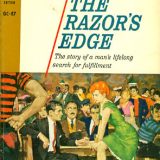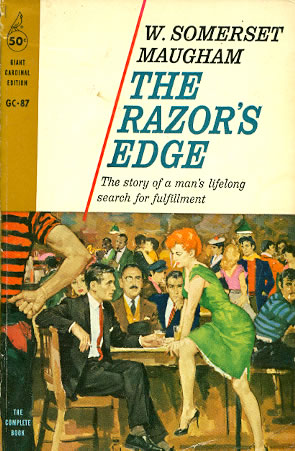The Razor’s Edge – William Somerset Maugham – 1944
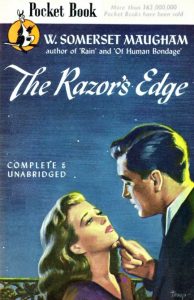
Posted by Dave on 24/11/2001, 6:15:57
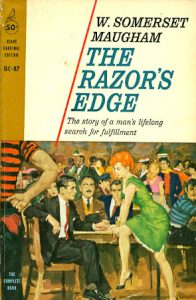 Ah, the Razor’s Edge… “I have never finished a novel with more misgiving.” No, just kidding, but when I read that first sentence of the book I thought it was the Foreword or a Preface or something. It’s quite an innovative literary device for an author to include him/herself in the story like that don’t you think? Have you encountered this before anywhere? The only other example that comes to mind for me is the novel “Perelandra” by C.S. Lewis in which he is one of the characters, but it is much more subtle and short-lived there than here in Razor’s Edge. I just thought this was a great aspect of the book.
Ah, the Razor’s Edge… “I have never finished a novel with more misgiving.” No, just kidding, but when I read that first sentence of the book I thought it was the Foreword or a Preface or something. It’s quite an innovative literary device for an author to include him/herself in the story like that don’t you think? Have you encountered this before anywhere? The only other example that comes to mind for me is the novel “Perelandra” by C.S. Lewis in which he is one of the characters, but it is much more subtle and short-lived there than here in Razor’s Edge. I just thought this was a great aspect of the book.
I’ve never read any other works of Maugham’s but I can now say that I appreciate his simple, straightforward style. The novel dealt with a few complex ideas, and grappled with nearly impossible questions through the character of Larry, but never did the story become weighed down and soggy.
I’ve spent a bit of time trying to summarize what the book is really all about, or how I would describe it in one or two sentences to someone. I’d like to hear your comments on my conclusion, and hear your perspective, maybe it’s very different from mine. For me, the book is about peace, or more specifically inner peace, and how different people choose to approach their ideas of inner peace and equilibrium. I think it’s interesting how Maugham concludes at the end that all of the characters achieved a sort of happiness in their own ways. But wow… the diverse ways they did so! And I found it poignant how in the end, perhaps the one we know LEAST about… is the narrator himself, the author! He does not share with us what he has gained or lost through his place in the story. Yet he was my favorite character, (the ubiquitous confidante) and definitely, the one I most identified with personally.
Of course, Larry is the pivot, the hinge character. Everyone has to come to one or another conclusion about Larry… but he is not obligated to do so in return. He is indifferent to the pursuits of others, yet everyone is concerned with Larry’s pursuits. Isn’t it interesting how that while everyone seems to be so involved in evaluating Larry’s stability and sanity, he remains the most stable and sane of them all? (Maugham himself is most like Larry. Agree/disagree?) While lives are undulating… Larry has, for the most part, spent the decade on an even keel. Others are gasping, he is sighing.
Elliott and Isabel are the perfect foils to the character of Larry. They represent materialism (Elliott, of the older generation, Isabel, of Larry’s own) over against Larry’s renunciation. Elliott’s summary of Larry’s character is that “he has no money to speak of and no position.” Isabel, though truly in love with Larry, ultimately chooses Gray Maturin over him because she doesn’t want to spend her life asking metaphysical questions that have gone unanswered for thousands of years. She scorns Larry’s studies because they are “impractical” to her. Even to Maugham, money means freedom… to Larry, it means bondage. Does any of this fizz Larry’s convictions about what is really important in life? Quite frankly… no! I think this is the quality of Larry that makes him a “hero” (if that’s the right word). It’s not so much the ANSWERS to his quest that make Larry a great figure. (Larry himself admits in his final talk with Maugham that he really hasn’t found the ultimate ANSWER to his original quest to unravel the nature of evil in the world. No, in the end he concludes basically that perhaps “the values we cherish in the world can only exist in combination with evil.” Perhaps all we can really do is “make the best of it.” Rather than actually “changing the world” he thinks that he may be at least able to create “a ripple effect” like a stone thrown into the water. The true GREATNESS of Larry is his strength of inner conviction and achievement of peace regardless of outward cost and opinion of others in the process.
“Europe” in this story emerges as almost a character. There is a reason that Maugham hauls everyone over there I think. It means different things to each. For Elliott, Europe means fashion, vogue, status, position, even title! It becomes his all! Hell, for Elliott, would be a place where the aperitif is not served on time! The concerns at the end of his life show how shallow and hollow his priorities really have been. For Isabel and Gray, Europe represents refuge, recovery… but also exile. They never seem to really fit in there. For Larry, Europe is that place of broadening out from what is known and familiar. It represents the type of knowledge and wisdom that one can only gain when faced with the unfamiliar. Maugham is the only real native European, and once again he is sort of a constant… Europe for him is home.
Were any secondary characters superfluous for you? For me, I see the importance of Kosti, and for Sophie MacDonald, both of them develop Larry in important ways. But the character of Suzanne Rouvier could have been as well left out. Maybe I missed something significant, if so, please enlighten me.
I really liked old Mrs. Bradley, Isabel’s mother. I always saw her as sort of sympathetic or at least undecided towards Larry. She withdraws from all true attacks on Larry and seems to me to draw upon past experience with hasty decisions made in the absence of love. (This is purely my speculation). At any rate… I have one question that I believe we as readers can ask ourselves that will point out our true reaction to meeting Maugham’s Larry in The Razor’s Edge, and the question is this:
If dear darling Isabel were our niece, or our daughter… how would we counsel her, if she were faced with the option of marrying either Larry or Gray? (knowing what we knew of each of these characters in the earlier part of the book). I think it’s a good question. Would we encourage her to consider the man who was perhaps less earthly ambitious, but who was asking the BIG questions of his world… or would we encourage her to “go for the money” and grab the man who seemed to have nowhere’s to go but UP… especially when we consciously were aware of the fact that her heart’s desire, indeed, her true love, was for the former man!
Awaiting your comments,
Adieu.
~
Posted by Michael Sympson on 24/11/2001, 8:04:38
Very nice and thorough reading – but your review left 2 questions open: 1. how do these people come across as people? Does Larry have a life – at least a few solid habits that make him recognizable as a person? 2. What did actually happen? What’s the story?
I am not trying to tease or to patronize – and I do know the story – but could it be a weakness of the book, if an attentive reader like you, Dave, is dropping the ball on these 2 aspects so soon and rather prefers to concentrate on the least important thing in any novel – the big ideas? That this cannot be your fault, I conclude from your research for the restaurant – that’s the sort of thing every good reader should do. And you do really look for the characters – but the author fails to deliver. In a sense the most hollow character, Elliott seems to have the most depth from the point of view of artistic character development.
Maugham himself must have had an inkling – he wrote a short story about a couple that after many decades of marriage finally faced its creator in the afterlife. It transpires that there was an episode of infidelity (I forgot of who – which in a real good story I shouldn’t) and the two expect God to set the record straight – one to be going to heaven and the other to hell. God listens to their squabbling and to the wronged party’s expression that she (he?) always had followed His moral code and rightfully expected recompense for not having conceded divorce. But God feels bored, and finally loses patience: he completely obliterates the existence of both – wipes the slate clean, so to speak; his own list of priorities is simply different from ours.
Probably Maugham’s strongest statement against big ideas and big morals. A laudable sentiment, but I rather had Maugham tell me more about the couple – who they were and what actually had happened. I felt short-changed.
Besides is “the true GREATNESS of Larry, … his strength of inner conviction and achievement of peace regardless of outward cost and opinion of others in the process,” really such a good thing? One has to be a great egotist to be a saint and cause all this grieve not just for oneself but for the surrounding people.
Maugham is giving just another example that as a writer one cannot develop characters based on an abstract idea. This is not a costume party, this is supposed to be a novel.
Michael
~
Posted by Andres Natal on 25/11/2001, 22:15:34
Somerset-Maugham’s “The Razor’s Edge” is one of the great works of Twentieth Century fiction. (It displays an interest in Indian mysticism that is the Anglo-Saxon counterpart to Hermann Hesse’s work in Germany. But, whereas Hesse had his missionary parents to thank for his interest in our “Indo-European” cousins in India, Maugham’s curiosity is rooted in his general interest in philosophy–which was one of his ruling passions.) –Sad to say that this interest (first stirred in the West by Theosophists) degenerated, by the 1960s, into becoming the preserve of the Maharishi Mahesh Yogi and his Pop musician adherents.
But no matter.
Maugham’s approach to the subject of finding meaning in one’s life (despite the encroaching vulgarities of everyday existence in a consumer society) was handled with restraint and taste. A wonderful book to start with if you have never read this English writer’s works before.
~
Posted by Chris on 27/11/2001, 1:17:10
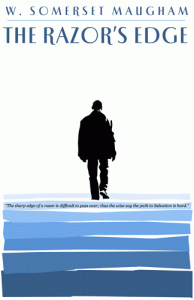 Upon completing The Razor’s Edge three aspects of the novel stuck in my mind. The first was the playful oversimplification of one of the novel’s chief themes as summed by Maugham in his final paragraph. Of course I am referring to his statement that each of the major characters achieved happiness (or at least contentment with their prospects for happiness) according to his or her own desires. I was preoccupied by this assertion because it reflects the most prominent impression made on me by the novel; that one’s definition of happy depends entirely on one’s definition of unhappy. Larry sought contentment in knowledge because, to him, the very nature of the unhappy consisted of the ignorance of, or worse, the indifference to, knowledge. Isabel sought comfort in domesticity and financial security because she feared the absence of such things.
Upon completing The Razor’s Edge three aspects of the novel stuck in my mind. The first was the playful oversimplification of one of the novel’s chief themes as summed by Maugham in his final paragraph. Of course I am referring to his statement that each of the major characters achieved happiness (or at least contentment with their prospects for happiness) according to his or her own desires. I was preoccupied by this assertion because it reflects the most prominent impression made on me by the novel; that one’s definition of happy depends entirely on one’s definition of unhappy. Larry sought contentment in knowledge because, to him, the very nature of the unhappy consisted of the ignorance of, or worse, the indifference to, knowledge. Isabel sought comfort in domesticity and financial security because she feared the absence of such things.
I think what Maugham was trying to posit was the idea that people don’t necessarily live their lives according to what they want (as we delude ourselves into believing) but rather, strive towards the goals which will insure an avoidance of those conditions of life which we fear. It is a pessimistic view of human nature (oh wouldn’t Joseph Conrad be proud?!) when put so bluntly, but I don’t think Maugham’s intention was as such.
The second aspect of the novel which intrigued me was the contrast between the characters of Larry and Isabel. These two, who seemed entirely incompatable from the beginning and left me wondering why Maugham insisted on construing their relationship as a mildly tragic love story, were, beyond the surface differences, really quite alike, and in the end left me somewhat dejected that they weren’t eventually brought together. I won’t go into depth about their differences as they surely were quite obvious, but I’d like to talk about, if I am able to do so lucidly, the similarity between them which so intrigued me.
Larry and Isabel both sought a simple life. Both wanted nothing more than for their most basic desires (not needs) to be met, and really nothing more. The problem with their union lie in the same idea that I have mentioned earlier; that the definition of unhappy shapes the definition of happy. For Isabel, simplicity meant a stable income and the respectability of a working husband. For Larry, simplicity was the casting off of convention and the concentration upon questions of meaning. Sadly, this shared desire for simplicity was embodied by two modes of living that were dramatically opposed (but not, necessarily in a dialectical sense) to each other. Utterly incompatible.
I say these were their desires and not their needs because during certain periods of the book both lived beyond their realms of comfort and were relatively happy. For Isabel this was after Gray’s bankruptcy and for Larry, during his stay in France and return (in a limited sense) to society upon returning from India.
My final lasting impression from the book was a longing to know more about Gray Maturin. He was kindhearted, sincere, money-obsessed,…but what else? I never quite believed that Isabel married him for his social and financial status; there must have been something else to him. He was interesting but underdeveloped.
I want to comment, also, on Michael’s question: “what was the plot?” I don’t believe there really was one central plot beyond the few subplots, and in the end I was satisfied with that. The beauty of a good book is observing the characters developing and changing in reaction to their circumstances; reacting in ways which reflect human nature and elicit an emotional sympathy from the reader. Sometimes books can compell without the aid of a plot to move them along, they can capture the imagination without a murder or a love story, they can be fascinating without being adventuresome. The Razor’s Edge fits into this category of novel; a page-turner without action. I think that, in the end, this characteristic separates true literature from common fiction.
Other thoughts:
This was the first Maugham book I’ve read and I truly enjoyed it. His writing style is simple and lucid, and surprisingly conversational. I could easily imagine having a drink with the author and him telling me this story in the exact words that were written on the page.
I agree with Michael that many of the characters (and even the major characters) in the novel weren’t very “real.” They were at times both incomplete and inadequate. Still, although their actions and motives seemed to represent cultural archetypes, I found Maugham’s use of them excellent in conveying the novel’s themes.
~
Posted by Lale on 27/11/2001, 14:47:37
Dave; Maxim, Deux Magots, Tour d’Argent, Dome etc. they are all here. Towards the end of the book they go to La Tour d’Argent which is one of the most expensive restaurants in Paris (1150 francs per person, excluding wine). Maxim’s is way too pricy for its quality. They now have a boat restaurant that looks very pretty at night, floating all lit up on The Seine. They also opened a cafe-kind, more affordable place, they called it Minim’s. But if any of you come to Paris, I’ll take you to down-to-earth restaurants that we can all afford and have delicious French food in very pleasant ambiance.
Why I liked this book:
1. I found myself in Larry (more on that later)
2. Quite a few brilliant quotable quotes (I will transcribe my favourites below)
And now, why I didn’t like this book:
Obviously, you all have found more “umph” in this book than I have. The Razor’s Edge reminded me Seinfeld’s joke about Grape Nuts: “You open the box, no grapes, no nuts!” I found the title of the book more scintillating than the subject matter. Incidentally I happened to learn that the Turkish title of the book was “The Victims of the Devil” which I find equally inapt.
Mr. Maugham’s style is too old fashioned: mention a name, describe him or her immediately, “prominent cheekbones … large mouth … strong white teeth … vividly blue eyes”. Michael, if there was ever a benchmark for cliche-ridden writing, this has to be it.
I also did not like the story being told in second hand, third hand, fourth hand. Kosti tells Larry, Larry tells Mr. Maugham and Mr. Maugham tells us.
I was very interested in Larry’s pursuits but I kept on waiting for something earth-shattering to happen, I kept on waiting for that umph. It never came. I enjoyed Larry’s experiences with the wise old men of India, his transformation, his philosophy but not enough.
Maybe, if the writing had been lyrical, you know, more fluid, more poetic, or more delightful, or more gripping, maybe then I would have enjoyed the book more.
However Maugham gave us some timeless, priceless quotes and I intend to do my part in spreading them:
Isabel and Larry, on learning:
‘And what is that going to lead to?’
‘The acquisition of knowledge,’ he smiled.
‘It doesn’t sound very practical.’
‘Perhaps it isn’t and on the other hand perhaps it is. But it’s enormous fun. You can’t imagine what a thrill it is to read Odyssey in the original. It makes you feel as if you had only to get on tiptoe and stretch out your hands to touch the stars.’
He got up from his chair, as though impelled by an excitement that seized him, and walked up and down the small room.
‘I’ve been reading Spinoza the last month or two. I don’t suppose I understand very much of it yet, but it fills me with exultation. It’s like landing from your plane on a great plateau in the mountains. Solitude, and an air so pure that it goes to your head like wine and you feel like a million dollars.’
Eliott, on dining alone:
” … more often than he would have liked anyone to know he suffered the humiliation of dining by himself in the privacy of his suite.”
Eliott, on nature:
“Eliott had always felt that the nature was an impediment to the social life … “
On migraines:
” … headaches so severe that he was incapacitated for twenty-four hours and as limp as a wet rag when they ceased.”
Maugham himself, on passion:
‘Passion doesn’t count the cost. Pascal said that the heart has its reasons that reason takes no account of. If he meant what I think, he meant that when passion seizes the heart it invents reasons that seem not only plausible but conclusive to prove that the world is well lost for love. It convinces you that honor is well sacrificed and that shame is a cheap price to pay. Passion is destructive. It destroyed Antony and Cleopatra, Tristan and Isolde, Parnell and Kitty O’Shea. And if it doesn’t destroy it dies. It may be then that one is faced with the desolation of knowing that one has wasted the years of one’s life, that one’s brought disgrace upon oneself, endured the frightful pang of jealousy, swallowed every bitter mortification, that one’s expended all one’s tenderness, poured out all the riches of one’s soul on a poor drab, a fool, a peg on which one hung one’s dreams, who wasn’t worth a stick of chewing gum.’
On nice but boring people:
“He was the kind of man with whom one would have hesitated to pass a lonely evening, but with whom one might cheerfully have looked forward to spending six months.”
I found bits and pieces of myself in Larry. The exultation he feels after having read something beautiful… The desire to go, look, search, learn, ponder… Larry did things I never had the courage to. Also I did not have his regular income which he acknowledges it enabled him to pursue his interests, but it is more of a courage thing. He went against the norms. He did it easily, comfortably, happily, peacefully. He was very young when he decided that he knew what he wanted. I admire and envy Larry for that.
I found an explanation why I never became a Larry (and probably, even in retirement I will never become one): It was the Isabel in me. Look what Isabel says here:
“Of course I want to travel. But not like that. I don’t want to travel second-class on steamships and put up at third-rate hotels, without a bathroom, and eat at cheap restaurants.”
That’s it. Thus kills the Isabel in Lale the Larry in Lale. (Cheap restaurants are ok but the hotel must have running hot and cold water.)
Good book.
Lale
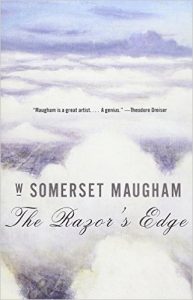
Posted by Michael Sympson on 28/11/2001, 3:16:25
Couldn’t agree more with Lale’s critique. Cliche-ridden, that’s the word. But I also notice that good readers seem to be as rare as good authors. Most of you look in the wrong places – good imaginative writing is all about style, structure and character – great ideas are hogwash. It is perfectly ok, if a fully develeoped character (and his author) at the beginning doesn’t know where he is going – if the character is alive, the story will take care of it by itself. Now, does Maugham’s novel even remotely reach the level of inspired writing? I don’t think so – and it seems neither does Lale. My remark is not meant to put down Maugham’s true qualities: he makes an excellent essayist and epigrammatist – but that’s where his talents reach their limit.
Michael
~
Posted by Anna van Gelderen on 1/12/2001, 16:32:44
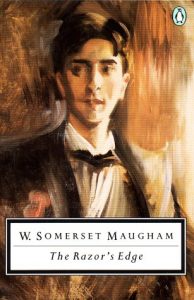 The first thing that struck me, was that this was an old-fashioned novel: an author/participant who starts out with the claim that his novel is based on a real story, who then takes his time to set the scene and who gradually introduces the characters, complete with descriptions. This is not your modern novel where you are plunged in in medias res, and where you have to figure out for yourselves who is who and what is going on. The background is old-fashioned, too: the period immediately following World War I. But even for that period the setting is archaic: it is the world of Henry James rather than that of D.H. Lawrence.
The first thing that struck me, was that this was an old-fashioned novel: an author/participant who starts out with the claim that his novel is based on a real story, who then takes his time to set the scene and who gradually introduces the characters, complete with descriptions. This is not your modern novel where you are plunged in in medias res, and where you have to figure out for yourselves who is who and what is going on. The background is old-fashioned, too: the period immediately following World War I. But even for that period the setting is archaic: it is the world of Henry James rather than that of D.H. Lawrence.
It is probably a matter of taste as to what you think of this old-fashionedness. I did not mind it all, in fact I rather liked it, as I have always enjoyed countless 18th and 19th novels as well. Of course I would not have cared for the novel if there had not been a lot of (yes, old-fashioned) literary craftmanship as well. Maugham presents his story very cleverly. We are all invited to make moral judgements on the characters in the book, but these people are not presented to us by an omniscient, nameless and bodiless writer, but by a participant in their lives. (The information we get about the characters therefore may come across as disjointed and secondhand, but isn’t that how we learn about people in real life?) Now the author may seem aloof and neutral, but that is deceptive. He is as flawed – and human – as any of his characters (he calls himself “immoral” to Isabel) and as his readers, for that matter – I am far from flawless at least, I don’t know about the rest of you.
This device gives the characters ambiguity and nuance. And that is why I cared what happened to them. Even Larry is not the Christlike figure he may seem to some. His attempt to play Jesus to Sophie’s Mary Magdalen is of course, though noble and well intentioned, also slightly foolish. The lovely Isabel in the end turns out to be downright nasty even by craftily luring Sophie back to the bottle and her doom, but even then Maugham tempers his condemnation of her – although I personally would not have been so mild).
All the characters’ lives provide a backdrop to Larry’s, as Dave pointed out rightly. They provide the relief against which he is sketched. Eliott and Isabel are people who seek happiness in having and possessing, Gray in doing – and Larry in being, which is very close to the Buddhist way of life (as far as I know; I am not a connoisseur of Buddhism). I agree with Chris that the author’s final statement, that all his characters got what they wanted, is filled with ambiguity; it left me in something of a quagmire at least. Larry is of course the true hero of the book, but Maugham also suggests (rightly, of course) that there are different ways to live one’s life for different people – only it is much easier to sympathize with and admire Larry’s choices than the silliness and empty pomposity of Eliot’s life.
As to Suzanne Rouvier: for me she provided a nice comparison to Isabel. Both marry for economic security, Suzanne more out of necessity than Isabel. I liked the practical and completely honest way Suzanne went about it. Unlike Isabel she has few illusions and it is exactly for this reason that it is easy for her to find happiness – or perhaps contentment is a better word. I think that is what Isabel finds as well.
It is interesting that so many readers, myself among them, identify at least partly with Larry and admire him for his selflessness and his lack of materialism. Unlike Lale I am perfectly happy to rough it and do with little more than a tent, a sleeping bag and an icecold brook on my travels – but only for a couple of weeks. When I get home I am extremely appreciative of my shower and central heating and of the job that brings in enough money for all my needs and more. But then I have not had the shattering war experience Larry had and neither has Isabel. Things would possibly have been different for both of them if Larry had not run away to the war.
I realize that this piece is getting way too long, so I will stop my musings here. Dave, thanks for this choice: I truly enjoyed reading this novel; it plus the comments on it have given me plenty of food for thought.
~
Posted by Lale on 2/12/2001, 3:23:55
: attempt to play Jesus
: to Sophie’s Mary
: Magdalen is of course,
: though noble and well
: intentioned, also
: slightly foolish.
What would have happened if they did indeed marry? Of course Sophie, without a solid and professional program, wouldn’t have been able to stay sober. What would have happened to Larry?
: As to Suzanne Rouvier:
: for me she provided a
: nice comparison to
: Isabel. Both marry for
: economic security,
: Suzanne more out of
: necessity than Isabel.
: I liked the practical
: and completely honest
: way Suzanne went about
: it. Unlike Isabel she
: has few illusions and
: it is exactly for this
: reason that it is easy
: for her to find
: happiness – or perhaps
: contentment is a
: better word. I think
: that is what Isabel
: finds as well.
Anna, this is an excellent point. It had never occured to me. Just like Dave, I had also found Suzanne Rouvier character superflous. But now I realize that she was there for a reason. Good point.
That was a very thorough analysis/review, Anna. It was worth our wait 😉
By the way, I heard W.S. Maugham’s short stories were great.
Lale
~
Posted by Anna van Gelderen on 2/12/2001, 13:44:23
: What would have happened
: if they did indeed
: marry? Of course
: Sophie, without a
: solid and professional
: program, wouldn’t have
: been able to stay
: sober. What would have
: happened to Larry?
Interesting question. I don’t think he would have been able to “save” her, even if she had managed to stay off the booze. She has been through far too much, al that grief, all that drink, all that selfabasement, to ever to be able to be happy again. Larry’s marrying her could have saved her from her incredibly sad death, though. But what would have happened to Larry? He probably would have coped, but at a price – and I don’t think it is right for one person to sacrifice himself for the sake of another. He also wants to marry her for the wrong reasons. Pity should not be the prevailing emotion in a proposal of marriage and they would have had a very unequal relationship. Nevertheless, I still can’t quite forgive Isabel for sending Sophie to her undignified death. She had no right to meddle, especially since she was (at least in my opinion) motivated by sheer possessiveness.
~~
Posted by Dave on 2/12/2001, 22:14:18
“A page-turner without action!” I like that phrase, it definitely describes The Razor’s Edge…. and also, I too could imagine having coffee with the author and having him recount the story pretty much the way it appeared here. It sounds crazy, but when I read a book I do not demand a lot of action out of it, or even intricacy of plot. (I guess that’s why I’m not a big fan of mystery novels or anything where you have to read it like a squinty-eyed Columbo, attempting to identify the killer before the author does). But all of that is just merely my own “preference”… I have nothing against other people who get completely caught up in mystery novels… but one has to be careful that the need for action doesn’t degenerate, and lead to an addiction to the type of pulp-fiction that resembles a transcript of a one-hour T.V. show! I have friends who read a lot of books… but if someone is not killed or robbed or at least shot in the first few pages… they set the book aside. For this reason, I’ve abandoned the giving of books as Christmas gifts for certain people because I abhor paying money for what they would want.
For me, I concentrate on character development, (in that sense, I agree with your definition of “the beauty of a book” Chris), believability (realism), and structural beauty that is not strained. By the latter I mean those times when you literally have to stop and re-read a sentence or a passage, and marvel over the impossibility of improving upon it. And not because of its unfathomableness (is that a word?) but rather because of its simplicity, and its ability to embrace reality. This is what I meant when I commented that Razor’s Edge was never “soggy”. I never got the impression of a sweaty author with half his hair torn out and sleeves rolled up to his armpits, tearing page after page out of his typewriter and starting over and over. It really was like listening to an intelligent retelling of events across a table. Simple, and not trying to prove anything, so much as just letting us in on the various ways that real people went about their avoidance of unhappiness. We all are constantly doing the same with each of our lives whether we are aware of it or not, and often there is not a lot of “plot” to it all.
~
Posted by Guillermo Maynez on 17/12/2001, 19:14:28
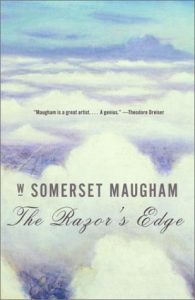 Before reading this book, I had the idea that I was going to like it, because I had read “Of human bondage” and two volumes of really excellent short stories by Maugham. A person with whom, as some others among you, I would gladly sit down in front of at a restaurant and let him do the talking.
Before reading this book, I had the idea that I was going to like it, because I had read “Of human bondage” and two volumes of really excellent short stories by Maugham. A person with whom, as some others among you, I would gladly sit down in front of at a restaurant and let him do the talking.
I will be very brief: whay I liked the book? Not for the grand ideas, certainly, but precisely because of style and character development. I disagree with the assertion that the book is cliche reading. I don’t think any of the characters lacks a definite, human personality. Isabel, for example, looks lika a cliche, until she talks nasty and throws a plate at the cool, controlled Maugham (my own favorite character in the book).
I like Maughams detached, distant but at the same time affectionate approach to his characters. In almost every story by him (so far as I have read) the point is a set of moral dilemmas. His characters, here and everywhere else, are faced with difficult decisions that involve moral judgement, and I find that compelling in a narrative. I simply liked the book.
Now, a masterpiece of the XX century? Probably not, but a good, well written novel about the dilemmas of people is not bad at all. I just finished rereading the Illiad and enjoyed it immensely, but Maugham remains one of my favorite authors in that corner which is not necessarily “canonical”.
~
Reviewed by: PRIYANKA.K Date: 15 May 2003
Razor’s Edge is a different yet wonderful novel for many reasons. The first among them being the innovative use of narration through the author. Before reading this particular novel I had read Maugham’s short stories and I liked them for their quirky humour. Not knowing exactly what to expect of this novel I was first surprised and then drawn into the story of Larry, Isabel, Elliot and the rest. The second and the most important reason being the idea of the story itself which unfolds through the eyes Maugham. The idea of Absolute and Reality is a very vague yet mystic conception of life. Larry’s search for realization is clearly described and in some ways it runs parallel to the life The Buddha and also each of us who strive for attaining realisation. My attempt here is not to explain what realisation is but only to try and drive home the importance of the questions that Larry asks. Isabel’s character on the other hand is materialistic and a complete contradiction to that of Larry. Maugham’s description of Sophie Macdonald’s life and her gory death is poignant to say the least. People who are really interested can do what Upaka Ascetic (reviewer above) has suggested to do about who Larry really was. I have done that and it has been most informative.I have read this book again and again only because the questions that Larry had are those which I too have. I really don’t understand Elliot’s and Isabel’s love for money and society. They have been described as excessively money minded and status conscious. And as Maugham says Gray is really lovable and that is what I think too. I would like to know more about Gray. Maugham’s novel is rightly praised and so is his straight-forward and sincere narrative.


